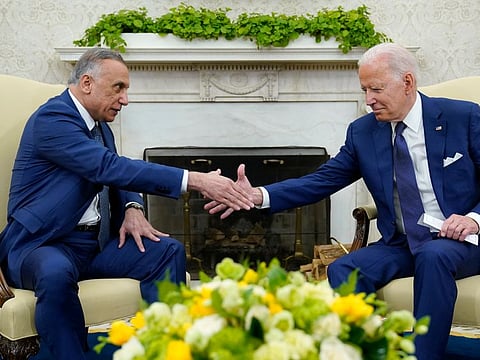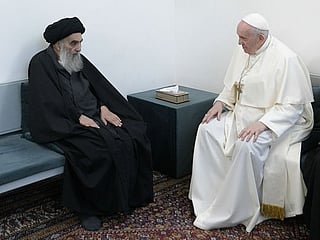Iraq’s security concerns post US withdrawal
Tehran’s undue influence and Daesh threat continue to be areas of concern in Baghdad

The announcement by President Joe Biden to end the United States combat mission in Iraq by the end of the year was expected. It was a long time coming and was the expected conclusion of America’s presence in the Arab country after 18 years of toppling the regime of Saddam Hussein.
The latest development gives Iraqi Prime Minister Mustafa Al Kadhimi a much-needed boost of status in Iraq, especially with the elections set for October. The American withdrawal is seen by many in Iraq as a victory over ‘the occupation’ and a major step in restoring the country’s sovereignty.
The Biden announcement, during his meeting with the Iraqi leader in the White House on Monday, comes shortly after his decision to withdraw his troops fully from Afghanistan. These moves are part of the president’s plan to end his country’s military engagements in the region, which he touted repeatedly during his election campaign last year.
While the withdrawal from Afghanistan, set to be completed in September, has already motivated Taliban to capture large areas, including a number of border crossings with understandably wary neighbours. A similarly hasty move in Iraq can be risky.
Major areas of concern
The threat of Daesh remains unyielding. Defeated in 2017, the terror group has proved many times its ability to regroup and attack. Its latest terrorist attack came on the eve of the Eid last week. The group claimed responsibility for the roadside bombing in Al Sadr City which killed at least 30 people and wounded dozens.
It is true that for years the US took upon the role of assisting and training Iraqi forces (without actually engaging in combat operations) but that role has been detrimental in the fight against Daesh, since the emergence of the group in 2014 when it managed to capture large parts of Iraq including the key city of Mosul.
Biden on Monday assured the Iraqi Prime Minister that the US military will continue to assist Iraq in its fight against Daesh and a joint statement said the security relationship will be focused on “training, advising and intelligence-sharing.”
Departure of US combat troops
Another risk that must be highlighted is the role neighbouring Iran would be playing in Iraq now that the Americans are leaving. Iran already yields significant influence in the Arab country through the Tehran-sponsored militias and politicians. For years, Iran sought the departure of US troops.
More recently, according to US intelligence, Iran encouraged its proxy militias to intensify their attacks on US and coalition forces and bases in Iraq to force a speedy withdrawal. Will Iraq be able to fend off Iran’s aggressive attitude in its pursuit for an expanded regional influence? That remains to be seen but certainly is a major challenge for the Al Kadhimi government.
The departure of US forces from Iraq, after almost two decades of occupation, is absolutely a cause for celebration in the country. But the reality on the ground forces difficult questions about the ongoing threats to its security and sovereignty as well as the recent opening to the country’s natural strategic depth, the Arab world.
Sign up for the Daily Briefing
Get the latest news and updates straight to your inbox








